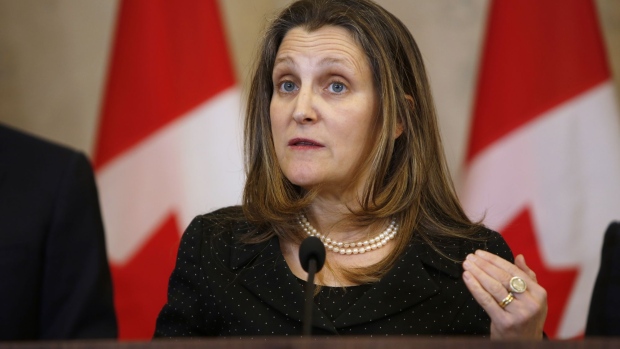Mar 28, 2023
Here Are the Key Takeaways in Canada’s Budget
, Bloomberg News

Finance Minister Chrystia Freeland released a budget in Ottawa on Tuesday that deepens Canada’s fiscal deficit as the Trudeau government books C$43 billion ($31.6 billion) in new costs over six years. New spending focuses on bolstering the health-care system, keeping up with the US on clean-technology incentives, and helping low-income Canadians cope with inflation. Debt as a proportion of total output will climb as a result, before resuming its downward trajectory. No return to budgetary balance is forecast.
(Bloomberg) --
Key Takeaways
- The deficit for the fiscal year ending this week grows to C$43 billion, or 1.5% of gross domestic product, from the C$36.4 billion Freeland forecast in her November budget update. By 2027-28, the government expects a shortfall of C$14 billion, instead of the C$4.5 billion surplus it previously projected
- Federal debt as a proportion of GDP will climb to 43.5% in the fiscal year that begins April 1, from 42.5% this year. It’s expected to decline to 42.2% in 2025-26 and 39.9% by the end of the forecast horizon
- Revenue projections are down C$5.7 billion on average per year from November’s budget update, reflecting a weaker economic outlook. Given still-elevated inflation and the impact of lower commodity prices, risks to the projection are tilted to the downside
- New spending on health transfers to provinces and expanded dental care totals C$31.3 billion over six years, while clean-energy incentives will cost C$20.9 billion over the forecast horizon. Targeted inflation relief measures total C$5.2 billion
- Prime Minister Justin Trudeau’s government is aiming to support Canada’s energy transition through a mix of investment tax credits and cash handouts. The budget includes a clean electricity tax credit worth C$6.3 billion over six years and one for hydrogen projects worth C$5.6 billion. Another investment credit for clean manufacturing, intended to be used for producing electric vehicle batteries or processing critical minerals, is worth C$4.5 billion
Debt and Taxes
- The government plans to issue C$172 billion in bonds in 2023-24, down 7% from the current fiscal year. It’s tilting its borrowing further to the short end, with two-year bonds accounting for 44% of total issuance
- Freeland’s budget changes tax rules for financial institutions that receive dividends from Canadian companies. Payouts will be taxed as business income, raising an expected C$3.2 billion over five years
- The Trudeau government is also changing the alternative minimum tax on high earners. It’s boosting the rate to 20.5% from 15%, while quadrupling the income threshold at which the tax might apply. The measure applies primarily to individuals who earn at least C$300,000
©2023 Bloomberg L.P.






